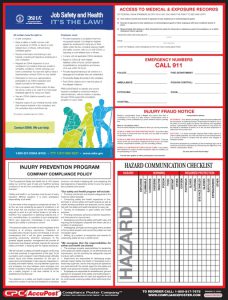 The Occupational Safety and Health Administration (OSHA) recently announced that it is pushing back the enforcement deadline for its anti-retaliation regulations for the second time this year. Although they became effective as of August 10, OSHA originally chose to delay enforcement for these regulations, including the required posting of an anti-retaliation statement, until November 1. The purpose of this first delay was to allow the agency time to address criticism of the provisions and spread awareness to the regulated community.
The Occupational Safety and Health Administration (OSHA) recently announced that it is pushing back the enforcement deadline for its anti-retaliation regulations for the second time this year. Although they became effective as of August 10, OSHA originally chose to delay enforcement for these regulations, including the required posting of an anti-retaliation statement, until November 1. The purpose of this first delay was to allow the agency time to address criticism of the provisions and spread awareness to the regulated community.
With this second delay, the new enforcement date is December 1, 2016.
Background and Controversy
These anti-retaliation provisions were passed in May of 2016 under the Improving Tracking of Workplace Injury and Illness rule, which requires businesses with 250 or more employees to file illness and injury reports electronically. This new electronic filing requirement will allow OSHA to create a searchable database of workplace injuries and illness hosted on their website for public perusal.
Proponents of the rule, such as OSHA Assistant Secretary of Labor David Michaels, say that the transparency gained by making this data accessible will “nudge” employers towards more robust safety standards, and that an efficient database will allow OSHA to target its efforts towards “establishments where workers are at greatest risk.” Although OSHA says it will screen the data to avoid revealing personal details, detractors cite privacy concerns as well as fears that businesses will be publicly shamed even for incidents that could not have been prevented.
Many have also expressed concern that OSHA’s anti-retaliation provision, which requires that employers’ reporting system for incidents must be “reasonable” enough so as not to “discourage or deter” employees from reporting, is too broad. Eight organizations, including the National Association of Manufacturers and Associated Builders and Contractors, have banded together to challenge the new rule in the U.S. District Court of Northern Texas, claiming that the anti-retaliation provision creates an unlawful ban on post-incident drug testing and safety incentive programs.
Recent Developments and Enforcement Delay
The most recent delay in enforcement was requested by the presiding judge in the case, who asked OSHA to allow the court more time to review the challenge to the provisions. OSHA agreed, adding another month to the already-delayed deadline for enforcement.
The agency also issued guidance on the disputed regulations, clarifying that safety incentive programs and drug testing are still allowed so long as they are not retaliatory in nature or likely to deter reporting. For example, it would be “reasonable” for an employer to drug test an employee whose impairment may have contributed to an incident. It could, however, be seen as retaliatory or deterrent to drug test an employee whose impairment could have no bearing on an incident, such as an employee who merely observed an incident.
Many states operating under OSHA state plans have thus far hedged their bets, not yet updating their state regulations and postings to be “substantially identical” to the new rule as required. However, until a final ruling is issued or an injunction laid against enforcement of the provisions, employers should proceed as though OSHA will definitely begin enforcement of their provisions on December 1.
We’ll keep you updated on this ongoing case, but in the meantime you can purchase the Federal Office OSHA poster if you wish to ensure that you’re compliant with OSHA’s anti-retaliation statement posting requirements before the December deadline.

